At nursing homes across Georgia, COVID-19 cases are near the lowest levels of the pandemic. Even during the delta-driven surge that filled hospitals and morgues this summer, high vaccination rates among nursing home residents kept new cases and deaths far below the toll of prior surges.
But the pandemic’s effect on senior care homes continues through a new plague: widespread staffing shortages.
“From our perspective, we are in a crisis,” said Katie Smith Sloan, CEO of LeadingAge, a national organization that represents 5,000 nonprofit aging services providers.
Long-term care providers faced staffing shortages before the pandemic. The situation worsened as the stress of working on the COVID-19 front lines prompted many workers to leave the industry. Now, almost every nursing home and assisted living community must scramble weekly to find enough staff. Some can’t take new admissions. Others rely on pricey agencies to fill gaps while also asking employees to cover extra shifts whenever possible.
“What that means is the staff who are left are exhausted,” Sloan said. “They are working probably longer shifts with little relief. What it also means is that there are a lot of people who aren’t able to access care when they need it. We have a growing number of underserved older adults in need of services and supports. That’s a huge problem.”
In Georgia, the issue is especially pronounced. The state has the fourth-lowest staffing level nationally for aides and nurses, according to a review of the most recent federal data by The Atlanta Journal-Constitution. More than 1 in 4 Georgia nursing homes earns a 1-star rating — the lowest — for staffing levels under the federal government’s quality rating system, the AJC found.
Credit: Robb Cohen
Credit: Robb Cohen
Some working in Georgia expect the challenge to worsen in the coming months. Hospitals, healthcare staffing agencies and other medical providers are battling for the same limited pool of employees. Other industries struggling to find workers are offering higher wages and more flexible schedules. Plus, in January a federal mandate that all nursing homes workers be vaccinated against COVID-19 kicks in.
“I don’t think we have peaked at our staffing challenges yet,” said Debbie Meade, CEO of Health Management, a nursing home company based in Warner Robins. “I’m terrified to say that, but it’s absolutely the truth.”
Fighting a war
The staffing challenges are top of mind almost every day for Deke Cateau, the CEO of nonprofit A.G. Rhodes, which operates three nursing homes in metro Atlanta.
As the nation celebrated Veteran’s Day in November, Cateau was celebrating long-time employees at A.G. Rhodes Atlanta, including three women who were retiring. One had worked there for 50 years. The other two had served 40 and 38 years. “I’m among some veterans today,” Cateau said at a banquet. ”You have literally been fighting a war for us.”
Credit: Courtesy
Credit: Courtesy
The retirements are bittersweet for Cateau, who knows these veterans can’t easily be replaced. He’s seen lots of valued workers leave because of COVID-19, while seeing other long-time employees stay in spite of the scars that come from seeing so much illness and death. “I describe it as PTSD,” he said.
Cateau said it’s time to do more to support those who work in long-term care. He said A.G. Rhodes is taking its own steps by upping hourly pay for direct caregivers to a minimum of $15 and offering a generous benefits plan. It is also providing a pathway for a diverse workforce to have the opportunity to move from aide to licensed nurse and eventually into management. But he said the whole long-term care system, mostly paid for by government health plans, needs to change to build a stable workforce for years to come.
“I don't think we have peaked at our staffing challenges yet. I'm terrified to say that, but it's absolutely the truth."
Pat Green, a licensed practical nurse who retired after 38 years at A.G. Rhodes, said it just felt like the right time. Her own mother is 89, she said, and needs support. But Green said she never questioned the need to be caring for elders during the pandemic.
“For me, I was raised like you treat people like you want to be treated,” she said. “You love what you do, and you just go in gung ho. This is what has been handed to us and so you do what you have to do to accomplish what you need.”
Searching for solution
Other industries struggling to find workers can make adjustments. Restaurants can cut back hours. Manufacturers can delay orders. But nursing homes have to have staff 24/7. If staffing is short, care can suffer. Residents may wait too long for bathroom assistance. Staff can’t immediately answer calls for help. Meals can be delayed, and those who need assistance with eating might not get it.
One Georgia nursing home operator recently had to pay a $500 per shift bonus to get workers to cover the weekend, said Tony Marshall, CEO of the Georgia Health Care Association, which represents the state’s long-term care industry. Because Medicaid covers most nursing home residents, the industry can’t just charge more to compensate for rising labor costs. The industry is asking the state of Georgia to do what other states have done: help cover rising staffing costs and revenue lost as nursing home occupancy rates have fallen.
Meade, the Warner Robins nursing home executive, said she values coming up with a solution to any problem But she can’t figure out the solution to the staffing problem. She has already increased wages three times and limited new admissions yet still has trouble hiring and risks losing those on her front lines, especially with more than a third hesitant to get vaccinated and the federal mandate approaching.
“They are stressed out, they are tired, they don’t know if they want to stay in this industry or any healthcare industry at this point in time,” Meade said.
About the Author
Keep Reading
The Latest
Featured




